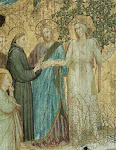Wednesday, November 5, 2008
The Life of Thea Bowman: Three Pivotal Periods
It is a commonly accepted truth that saints cannot develop in isolation. Instead, saints are individuals who serve as examples to others. While not yet canonized Thea Bowman, the subject of this paper, made a tremendous contribution both to the Franciscan family and to the entire Catholic Church in the United States.
While religious congregations made every effort to return to their original charism after the second Vatican Council, congregations of the Franciscan Third Order had particular struggles with identity. Because of difficulties with canon law, they often had a number of founders and a number of charisms. In addition to these struggles, Thea, as an African-American woman, found herself dealing with issues of racial and cultural diversity. Thea's courage, strength, and Franciscan willingness to embrace community allowed her both to create a more welcoming cultural environment, and to facilitate ongoing dialogue around issues of diversity.
ABOUT THE AUTHOR:
Laura Nettles is a member of the Franciscan Sisters of Perpetual Adoration. She holds a BA in music education, and is completing a Master's degree in Franciscan Studies.
The School Sisters of St. Francis of Christ the King: Were They Meant to be Franciscan?
In the years following the second Vatican Council, religious congregations made efforts to return to their original charism. For congregations of Franciscan women of the Third Order, both canon law and the customs of religious life made questions of identity and origin more complex. In addition to Francis, Clare, and other prominent figures in the Franciscan tradition, many congregations of the Third Order Regular were influenced by fascinating and powerful figures who have remained conspicuously absent from the historical tradition. This paper explores the role of Antonia Lampel and Margareta Pucher in the creation of School Sisters of St. Francis of Christ the King. It explores the questions of intentionality, canon law, desire of the sisters, and modern needs in assessing the Franciscan character of this congregation.
ABOUT THE AUTHOR:
Maryann Dosen is a member of School Sisters of St. Francis of Christ the King. She has taught at various levels for over twenty years, and is completing a Master's degree in Franciscan Studies.
Reading Theology to the Brothers: The Background to St. Anthony's Opus Dominicale
Anthony of Padua (c. 1190-1231) was a prominent and influential figure in the Franciscan tradition, yet remains virtually untouched by English-speaking Franciscan scholars of the modern world. The present article is part of an ongoing endeavour to correct this, and explores part of Anthony's life and more importantly, his legacy. In particular, it treats the question, how did St Antony of Padua come to write his great series of commentaries on the Sunday Gospels, which he himself called his Opus Evangeliorum, but which is generally known today as his Sermones Dominicales?
ABOUT THE AUTHOR:
Paul Spilsbury gained a PhD in 1999 from Bristol University, England, for his research into the writings of St Antony. His translation of these writings is currently being published in four volumes by the Franciscan publishing house, Edizioni Messaggero, at Padua. This article is condensed from his ongoing work on the background to the Saint’s writings.
Fraternitas Minorum: The Franciscan Spirituality of Fraternity
ABSTRACT:
In the last days of the second millennium, as in the time of Brother Francis, a great ecumenical council was convened to reform the Church. At the great second council of the Vatican the members of religious orders were called to return to the inspiration of their founders to guide them in the process of reinvigorating each charism for life and service in the contemporary world. However, even before this great undertaking was embarked upon, let it not be said that the original inspiration of Brother Francis and his fraternity had grown cold in his brothers and sisters. Taking incidents from both the lives of Franciscans in the modern age, and examples from the tradition, this paper provides a nuanced and interdisciplinary meaning of the concept of fraternitas in Franciscan tradition.
ABOUT THE AUTHOR:
Stephen King is a doctoral student at the Graduate Theological Union at Berkeley. He has completed a Master's degree in Franciscan Studies at the School of Franciscan Studies, St. Bonaventure University.



